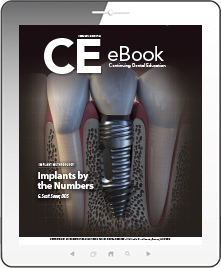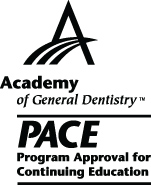CDEWorld > eBooks > Implants by the Numbers


ADA CERP is a service of the American Dental Association to assist dental professionals in identifying quality providers of continuing dental education. ADA CERP does not approve or endorse individual courses or instructors, nor does it imply acceptance of credit house by boards of dentistry. Concerns or complaints about a CE provider may be directed to the provider or to ADA CERP at www.ada.org/cerp/

Approved PACE Program Provider. FAGD/MAGD credit. Approval does not imply acceptance by a state or provincial board of dentistry, or AGD endorsement. 1/1/2023 to 12/31/2028. ID # 209722.
eBook
Released: Monday, February 12, 2018
Expires: Sunday, February 28, 2021
Implants by the Numbers
By G. Scott Sauer, DDS
Commercial Supporter: PDS University — Institute of Dentistry
Dental implants offer a long-lasting solution to edentulism, or toothlessness. The author of this article explains his methodology for dental implants, known as "restorative address 73-422." This method helps navigate an implant start to finish, where each number corresponds to a significant measurement in the dental implant process. The author also stresses the importance of clear communication between dentist and patient, as well as dentist and surgeon, in order to ensure a successful implant experience.
LEARNING OBJECTIVES:
-
List the important measurements regarding the placement of the implant platform.
-
Describe the effect that each of these measurements will have on the resulting restoration.
-
Communicate necessary implant platform positions to the surgeon accurately.
About the Author
G. Scott Sauer, DDS
Practices dentistry at Eldorado Smiles and Orthodontics, Frisco, Texas; Implant Subject Matter Expert and Faculty at PDS Institute, Irvine, California


